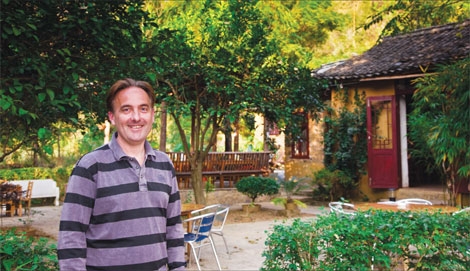Outside innside
Updated: 2010-12-02 17:54
By Erik Nilsson (China Daily)
|
|||||||||||

Herbert Bloembergen at his Outside Inn, located in Chaolong village, outside Yangshuo, in the Guangxi Zhuang autonomous region. Photo For China Daily
Dutchman leases ramshackle village in Guangxi and turns it into a popular resort
It was a ghost town in the middle of nowhere. That is exactly why Herbert Bloembergen wanted it. Everyone told the Dutchman he was crazy when he tried to lease an entire, mostly abandoned and ramshackle village in South China. When he decided to turn it into a holiday resort, people told him he was plain nuts.
"In the Chinese mind, one goes from the village to the city, from an old house to a new house - not the other way around," says the 46-year-old, who has lived in the country for a decade.
"So, who would want to stay in the countryside in an old farmhouse somewhere off the main road?"
The answer, it turns out, is a lot of people.
While the plan was crazy enough, it seemed it might just work. And it did.
But in 2003, the constellation of nine remote farmhouses among the limestone formations of Chaolong village, outside of the Guangxi Zhuang autonomous region's Yangshuo town, had largely been abandoned, as villagers opted for new abodes along a newly paved road.
Bloembergen says he had to strike deals with the homeowners, and then repeat the process again and again with their brothers, cousins and increasingly distant relatives.
"I think I only managed to get all these people to agree because they all thought I was crazy," he says.
"They probably just thought, 'we get the rent for buildings we don't use, and we have nothing to lose, really'."
Today, Bloembergen's Outside Inn is an acclaimed holiday retreat and a regular feature on the tourist map.
Its annual average occupancy rate is 45 percent, while more than 60 percent of rooms are full during peak season, and all of them are taken up every national holiday. But most visitors dine and dash, rather than stay overnight.
Bloembergen has a range of single rooms, doubles and family rooms for four people. This year, he added the first entirely new structure to the resort - a three-story building with apartments on every floor, mostly for families to stay together.
While word-of-mouth helped Outside Inn increase its patronage, the purchase of Google advertising has caused occupancy to surge, management says.
Most guests are well-healed expats, with nationals accounting for about 5 percent of clientele.
Outside Inn essentially owes its success to the very location that caused skeptics to scoff, Bloembergen says.
"I always find that tourists spent too much time in big, often enormous, cities and very little time in the countryside," he says. "I noticed with the Dutch tourists I was taking through China that people wanted to spend more time in the countryside."
The retreat is tucked in a cave-pitted swath of earth that undulates with karsts scattered among patchworks of shimmering rice paddies. It is a magnificent landscape traversed by a cast of gregarious farmers, scampering chickens and plodding water buffaloes.
Bloembergen discovered Chaolong while working as a guide for a Dutch travel company, a gig he landed after resigning from his software consultancy job in the Netherlands to start anew in China in 1999.
When an aimless bicycling trip brought him to the farmhouse cluster, he knew he had discovered a special spot.
But Bloembergen says it took time to get people to visit and stay in Chaolong. The SARS epidemic had also seized the country just when he was pioneering his unorthodox tourism concept.
Soon after he began renovating the village, curiosity lured officials, businesspeople and other VIPs from Yangshuo to Chaolong to see what the Dutchman was doing with these rustic and remote farmhouses.
"Most of them came, saw and left, concluding that this strange foreign idea was never going to work," Bloembergen recalls.
"As one of my Chinese friends then put it, 'Even a beggar knows, you need to be on a busy street to do business'."
However, many believe nearby Yangshuo - a bastion of backpackers seeking a genuine slice of rural southern China after visiting the globally celebrated sights of Guilin - is now stuck in a tourist traffic jam.
The former farming village has swollen to become a bustling tourist town, chock-a-block with bars, souvenir shops and more than 300 hotels.
As Yangshuo heaves with thousands of tourists and the growing pains they bring, travelers seeking more pristine specimens of rural China are casting their eyes toward its hinterlands - and so, too, are hoteliers.
Establishments emulating the Outside Inn model have been opening in the surrounding countryside and are luring more guests, Bloembergen says.
The Dutchman explains his relationship with the village is "very good" but not without snags.
"Whenever there are issues, about water, waste or anything else, we solve it the best we can, as fast as we can," Bloembergen says.
The villagers call him Aka, after the youthful protagonist of a folktale about a boy who goes hunting and returns with the biggest animals anyone had ever seen.
Bloembergen makes special efforts to mesh with the locals and says they appreciate the fact that he shows up at funerals. Outside Inn employs five local staff members, and locally contracts construction and renovation jobs.
"I am a foreigner here, and I have created my own thing in farmhouses that nobody wanted at that time," Bloembergen says.
In doing so, he has turned the ghost town that is Chaolong into a living local legend - a feat that might leave some thinking: "Crazy, isn't it?"











